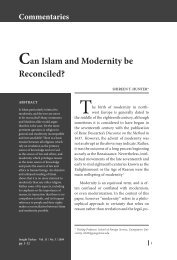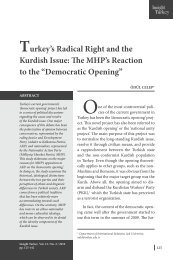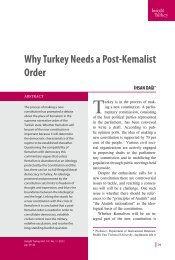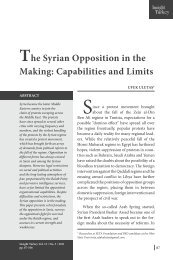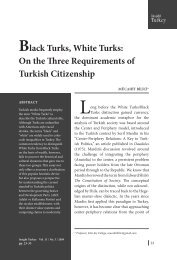Culture of Co-existence in Islam: The Turkish Case
Culture of Co-existence in Islam: The Turkish Case
Culture of Co-existence in Islam: The Turkish Case
Create successful ePaper yourself
Turn your PDF publications into a flip-book with our unique Google optimized e-Paper software.
ALİ BARDAKOĞLU<br />
ligious groups s<strong>in</strong>ce their arrival to Anatolia <strong>in</strong> the 11 th century, and Turks on<br />
the move have always had commercial, cultural and political relations with other<br />
nations and states. <strong>The</strong> result<strong>in</strong>g web <strong>of</strong> relations contributes to an <strong>in</strong>clusive understand<strong>in</strong>g<br />
<strong>of</strong> religion, as <strong>Turkish</strong> Muslims have never lived <strong>in</strong> their own ghettos<br />
<strong>in</strong> cultural and geographical terms. Turks susta<strong>in</strong>ed this non-isolationist legacy<br />
and developed it further <strong>in</strong> the process <strong>of</strong> their social, cultural, political and economic<br />
relations with the other communities they have encountered throughout<br />
their history.<br />
Turkey’s western orientation, known affectionately as Turkey’s European vacation<br />
has, s<strong>in</strong>ce at least the 19 th century, shaped Turkey’s political culture, legal<br />
<strong>in</strong>struments and public policy. Even dur<strong>in</strong>g the Ottoman Empire, it contributed<br />
to the rise and expansion <strong>of</strong> the ideas <strong>of</strong> liberty and equality. <strong>Co</strong>nstitutional<br />
reforms and modernization efforts, as well as <strong>in</strong>creas<strong>in</strong>g contacts with the<br />
western <strong>in</strong>tellectual and cultural heritage, have served to strengthen Turkey’s<br />
European orientation. Moreover, Turkey’s EU membership project, begun <strong>in</strong><br />
the early 1950s and gather<strong>in</strong>g momentum <strong>in</strong> 2005, brought Turkey much closer<br />
to Europe. <strong>The</strong> legal and political reforms undertaken dur<strong>in</strong>g the membership<br />
process have also consolidated the freedom <strong>of</strong> religion and protection <strong>of</strong> m<strong>in</strong>ority<br />
faith communities.<br />
Secularism and the culture <strong>of</strong> democracy <strong>in</strong> Turkey likewise provide pr<strong>in</strong>ciples<br />
that are crucially important for the protection <strong>of</strong> pluralism and freedoms. By embrac<strong>in</strong>g<br />
democracy, the rule <strong>of</strong> law, and secularism, Turkey has chosen a path that<br />
enables people <strong>of</strong> various backgrounds to live peacefully <strong>in</strong> the same social and<br />
political order without abandon<strong>in</strong>g their culture, religion or identity. Structural<br />
and legal provisions, as well as their social acceptance by the majority <strong>of</strong> <strong>Turkish</strong><br />
citizens, have led to the establishment <strong>of</strong> <strong>in</strong>dividual freedom <strong>of</strong> religious belief<br />
and practice, as well as the freedom <strong>of</strong> expression as far as <strong>in</strong>terpret<strong>in</strong>g religion is<br />
concerned, i.e. what might be called <strong>in</strong>tra-religious freedom or freedom with<strong>in</strong> a<br />
religion. This is one <strong>of</strong> the peculiar characteristics<br />
<strong>of</strong> modern Turkey today.<br />
<strong>The</strong> Presidency <strong>of</strong> Religious<br />
Affairs (the Diyanet) has made<br />
considerable <strong>in</strong>stitutional<br />
contributions to the promotion<br />
<strong>of</strong> religious diversity and the<br />
culture <strong>of</strong> co-<strong>existence</strong> <strong>in</strong><br />
Turkey<br />
Although there is a wide consensus<br />
on the acceptance <strong>of</strong> secularism and democracy,<br />
there is an ongo<strong>in</strong>g debate <strong>in</strong><br />
Turkey on state-religion relations, as is<br />
to be expected <strong>in</strong> a dynamic society. This<br />
debate is sometimes extended to <strong>in</strong>clude<br />
the limits <strong>of</strong> freedom <strong>of</strong> religion <strong>in</strong> the<br />
122



